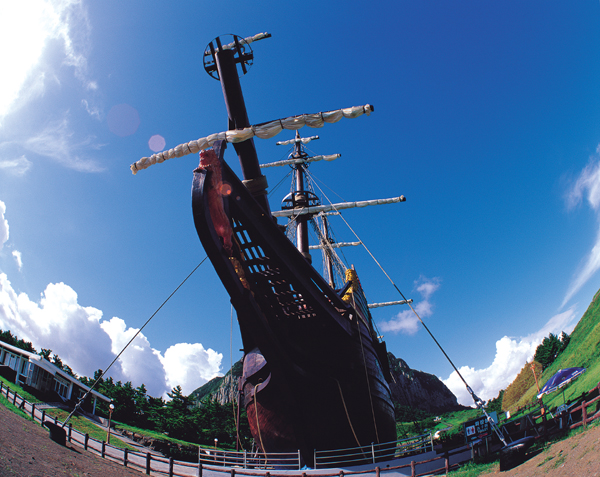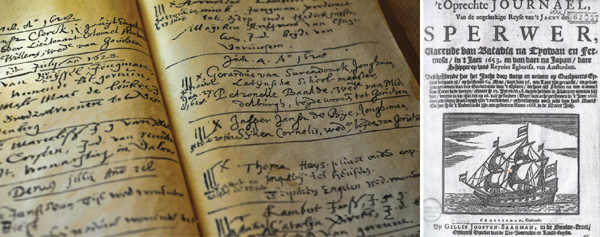
- Updated 2024.4.24 17:16
- All Articles
-
member
icon
-
facebook
cursor
-
twitter
cursor
|
Art&CultureHistory |
Not what they signed on forFate of 1653 Dutch crew shipwrecked on Jeju solidified ‘Hermit Kingdom’ reputation |
|
| |
 |
|
| ▲ A replica of Hamel's boat, which ran aground off Jeju's southern shore in 1653, is a popular tourist attraction with an unattractive past. Photo courtesy Jeju Provincial Govt. |
Perhaps the most infamous shipwreck in Korea is the Sperwer that wrecked off the west coast of Jeju on Aug. 15, 1653. It was the survivors of the Spewer and their accounts, particularly Hamel’s, that gave the world its first in-depth information on this unknown part of the world, and also the start of the Koreans’ ill-deserved reputation for being inhospitable to foreigners who they either killed or held against their will.
The Sperwer, under the command of Captain Reijnier Egberstz, had a crew of about 35 men and was bound for Nagasaki, Japan, from Formosa (Taiwan). In addition to the cargo, there were around 30 passengers, probably employees of the Dutch East Indies Company, who took passage aboard the ship. As the ship approached Japan it encountered a powerful typhoon and was forced towards Jeju island where it wrecked in the middle of the night.
Only 36 men made it to shore and huddled in a crude tent made from one of the sails. Eventually the storm died and they were able to make a fire to warm themselves but this also attracted the attention of a small group of Koreans who reported their presence.
A band of 100 armed Koreans was sent to watch over them until the following morning when an army of 1,000 – 2,000 Korean soldiers arrived and took command of the Dutch. Over the next couple of days the Koreans began salvaging the wreck.
After all the salvageable goods were removed from the ship they were placed in front of the Dutch crew and then sealed. The Korean commander made it clear that he would not tolerate theft. Several Koreans who had stolen some of the salvaged goods were brought before the Dutch and “were beaten on the soles of their feet, with sticks about one fathom long and as thick as the arm of an average boy. Some lost the toes of their feet. Each one received 30 or 40 strokes.”
The Dutch were then taken to the island’s magistrate, most likely in Jeju city. The men, badly frightened, were each given a cup of rice water while they awaited their fate.
“We thought this was going to be our last drink and that together we were going to die,” wrote Hamel, “so terrible was the sight of guns and war material, as well as the display of all manner of dress.”
| |
 |
|
| ▲ Pages from the ship's journal is part of Jeju's history. Photos from Vibeke Roeper and Boudewijin Walraven, ed., Hamel’s World: A Dutch-Korean Encounter in the Seventeenth Century (Amsterdam: Sun Publishers) 2003 |
Instead of being executed they were made reluctant guests. They were given a home that was once the residence of Gwanghae, a former king of Korea. Gwanghae was a tyrant who had ruled Korea from 1608 until he was dethroned in 1623. He was then exiled to Kanghwa island and later, in 1637, moved to Jeju island where he stayed until his death in 1641.
The Dutch were guarded but treated very well. The magistrate held feasts and other entertainment and tried to encourage them by telling them they would soon be sent to Japan. He also learned some Dutch from them and in turn taught them some Korean.
Nearly 10 weeks after their shipwreck they were summoned to the magistrate where they met a Korean “man with a long red beard” and spoke Dutch “in a very broken way.” He was, in fact, Jan Jansz Weltevree, a Dutchman, who was marooned on the coast of Korea in 1627. Their happiness at meeting him soon faded when they discovered that he had petitioned the Korean king long ago to be allowed to leave but the king had replied,
“If you were a bird you might fly there. We do not send strangers away from our country. We will take care of you, giving you board and clothing and thus you will have to finish your life in this country.”
The months passed and in December a new magistrate arrived. The old magistrate, prior to leaving, presented them with gifts including warm clothing and apologized for not being able to send them to Japan, but he did promise to aid them once he returned to Seoul. The new magistrate was less generous with the Dutch and they became greatly disenchanted.
At the beginning of May some of the Dutch attempted to escape in a Korean junk but, being unfamiliar with it, they were forced to return to shore. Each man was then “bound tightly to a heavy plank, one hand imprisoned by a clamp nailed to the plank, and a chain put around his neck.” They were later given “25 strokes on the bare buttocks with paddles as wide as a hand and as thick as a finger” which left them bed-ridden for about a month.
The following month the Dutch were transferred to the mainland where they made their way to Seoul where they were given duties and eventually moved to other parts of Korea. They remained in Korea until eight of them escaped in September 1666 and the following year the remaining eight were allowed to return to Japan. One, however, elected to remain in Korea, probably because of his Korean family, but his fate is unknown. |
|
|
|
|
|
|
|
ⓒ Jeju Weekly 2009 (http://www.jejuweekly.net)
All materials on this site are protected under the Korean Copyright Law and may not be reproduced, distributed, transmitted, displayed, published without the prior consent of Jeju Weekly. |
|
|
|
|
| Jeju-Asia's No.1 for Cruise |
|
|
|
Title:The jeju Weekly(제주위클리) | Mail to editor@jejuweekly.net | Phone: +82-64-724-7776 Fax: +82-64-724-7796
#503, 36-1, Seogwang-ro, Jeju-si, Jeju-do, Korea, 63148
Registration Number: Jeju, Ah01158(제주,아01158) | Date of Registration: November 10,2022 | Publisher&Editor : Hee Tak Ko | Youth policy: Hee Tak Ko
Copyright ⓒ 2009 All materials on this site are protected under the Korean Copyright Law and may not be reproduced, distributed, transmitted, displayed, published
without the prior consent of jeju weekly.com.

|





















